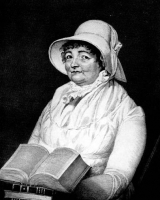Witchcraft In Middleton
Around 1630 a man named Utley, presumably from Middleton was accused of witchcraft, tried at Lancaster, found guilty and hanged. It was thought that he had bewitched to death Richard Assheton (before 1625 – 1630), first son of Sir Ralph Assheton Esq, Lord of Middleton and his wife Elizabeth Kaye. This case is referred to in Lancashire Folk-lore by Harland and Wilkinson 1867, also Discovery of Witches, The Wonderfull Discoverie of Witches in the Countie of Lancaster by Thomas Potts, but no further information about the trial is available.
Ralph Assheton
 Thirteen year old Ralph Assheton (1605 – 17 February 1650) became Lord of Middleton in 1618 when his father passed away. In 1631 he refused a knighthood and in 1640 he became one of the two Members of Parliament for Lancashire, the other being William Brereton (his cousin). In 1642 he was made deputy Lieutenant of the County of Lancashire and when the Civil War began he was given a Colonels commission and command of the Levies of South Lancashire for Cromwell. His regiment went to relieve Cockermouth Castle (1648), took part in the Siege of Appleby Castle, Siege of Bolton (1643), fought at Chester, Nantwich, Lancaster, Rowton Moor, Whalley (1643), Middlewich, Lathom, The Battle of Marston Moor and The Battle of Preston (1648). Promoted to Major General and given command of the Lancashire Armies, Ralph Assheton actually opposed the execution of King Charles I and intriguingly died the following year amid possible suspicions of treason. He is buried in Middleton Parish Church where a monumental brass of Major-General Sir Ralph Assheton can be found. This is the only brass of an armoured Civil War officer in Britain.
Thirteen year old Ralph Assheton (1605 – 17 February 1650) became Lord of Middleton in 1618 when his father passed away. In 1631 he refused a knighthood and in 1640 he became one of the two Members of Parliament for Lancashire, the other being William Brereton (his cousin). In 1642 he was made deputy Lieutenant of the County of Lancashire and when the Civil War began he was given a Colonels commission and command of the Levies of South Lancashire for Cromwell. His regiment went to relieve Cockermouth Castle (1648), took part in the Siege of Appleby Castle, Siege of Bolton (1643), fought at Chester, Nantwich, Lancaster, Rowton Moor, Whalley (1643), Middlewich, Lathom, The Battle of Marston Moor and The Battle of Preston (1648). Promoted to Major General and given command of the Lancashire Armies, Ralph Assheton actually opposed the execution of King Charles I and intriguingly died the following year amid possible suspicions of treason. He is buried in Middleton Parish Church where a monumental brass of Major-General Sir Ralph Assheton can be found. This is the only brass of an armoured Civil War officer in Britain.




Recent Comments